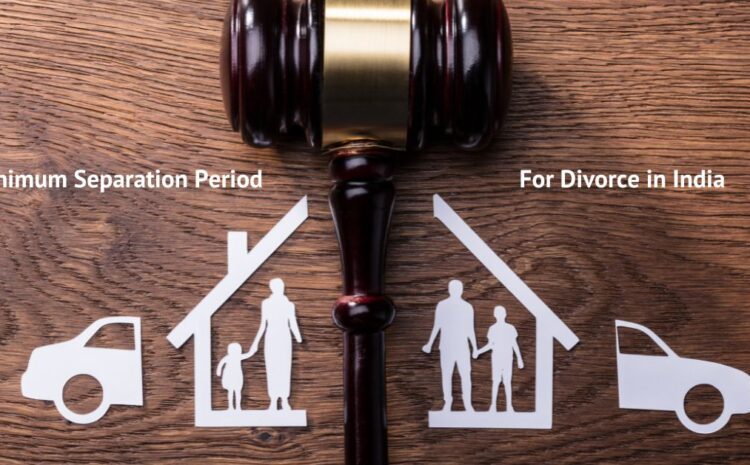
Divorce in India is a complex process governed by various personal laws, which often require couples to undergo a period of separation before they can legally dissolve their marriage. This separation period is intended to give the spouses time to reconsider their decision and ensure that the marriage has indeed irretrievably broken down. The minimum separation period for divorce in India varies between mutual consent and contested divorce, which is based on the grounds for divorce and also based on the personal laws applicable to the couple. This article delves into the legal requirements, relevant case laws, and nuances of the minimum separation period for divorce in India.
Separation Period Under Hindu Marriage Act, 1955
The Hindu Marriage Act of 1955, which governs marriages and divorces among Hindus, Buddhists, Jains, and Sikhs, provides for a mandatory separation period in some instances of divorce.
Section 13B: Divorce by Mutual Consent
Under Section 13B of the Hindu Marriage Act, 1955, couples can file for divorce by mutual consent, provided they have been living separately for at least one year. The law defines “living separately” as not living as husband and wife, which can include physical separation or even living under the same roof but without cohabitation.
Process:
– First Motion: The divorce process begins with the filing of a joint petition by both spouses, stating that they have been living separately for one year or more and that they have mutually agreed to dissolve the marriage.
– Cooling-off Period: After the filing of the first motion, the Court imposes a six-month “cooling-off” period. This period is intended to allow the couple to reconsider their decision and explore the possibility of reconciliation. However, the judiciary has relaxed the cooling-off period, where the Court has discretionary powers to waive it in cases of irretrievable breakdown of marriage.
– Second Motion and Final Decree: After the six months/ after waiving off the cooling off period, the parties appear before the Court to confirm their intention to divorce and go through a mediation process. The mediator, after talking to both spouses, prepares a mediation report and submits it to the Court. If the Court is satisfied that the marriage is irretrievably broken, it will grant the divorce decree.
Amardeep Singh v. Harveen Kaur (2017) 8 SCC 746: In this landmark judgment, the Supreme Court ruled that the six-month cooling-off period under Section 13B(2) of the Hindu Marriage Act is not mandatory and can be waived in certain circumstances. The Court held that if the marriage has irretrievably broken down and there is no possibility of reconciliation, the cooling-off period can be waived, allowing for a quicker divorce process.
Also Read: – Can Husband And Wife Live Separately Without Divorce
Section 13(1): Divorce on Specific Grounds
Apart from mutual consent, Section 13(1) of the Hindu Marriage Act provides for divorce on specific grounds, such as adultery, cruelty, desertion, conversion, renunciation of the world, not heard of for seven years, or more contagious venereal disease and mental disorder. In the case of divorce based on desertion, a minimum separation period of two years is required. In the case of applying a ground of ‘not heard of’ minimum period of 7 years, there should not be any knowledge on the whereabouts of the respondent by those who naturally would have if they had been alive.
Process:
– Filing the Petition: The aggrieved spouse can file for divorce if their partner has deserted them for a continuous period of at least two years or seven years or more without hearing from the respondent.
– Court Proceedings: The Court examines the evidence of desertion/ assumption of death and other relevant factors before granting a divorce decree.
Bipinchandra Jaisinghbhai Shah v. Prabhavati (1956) AIR 176: In this case, the Supreme Court laid down the definition of desertion as “the permanent forsaking and abandonment of one spouse by the other without the other’s consent and reasonable cause.” The Court emphasized that the desertion must be for a continuous period of two years before filing the divorce petition.
Separation Period Under Special Marriage Act, 1954
The Special Marriage Act of 1954 applies to marriages between individuals of different religions or those who choose to marry under secular law. The provisions regarding separation and divorce under this Act are similar to those under the Hindu Marriage Act.
Section 28: Divorce by Mutual Consent
Section 28 of the Special Marriage Act provides for divorce by mutual consent, requiring a minimum separation period of one year before the divorce petition can be filed.
Process:
– First Motion: Both spouses must file a joint petition after living separately for one year.
– Cooling-off Period: Similar to the Hindu Marriage Act, a six-month cooling-off period is required before the second motion can be filed. Waiving off the waiting period is also allowed.
– Second Motion and Final Decree: If the Court is satisfied after the second motion, the divorce is granted.
Suman v. Surendra Kumar AIR 2002 SC 254: The Supreme Court reiterated that the cooling-off period is designed to prevent hasty divorces and encourage reconciliation. However, it also acknowledged that in cases where reconciliation is impossible, the Court may waive the period. The judgment insisted on the presence of both parties for both motions.
Section 27: Divorce on Specific Grounds
Section 27 of the Special Marriage Act allows for divorce on grounds such as adultery, desertion, cruelty, and others, as mentioned under the Hindu Marriage Act above in this article. For desertion, a minimum separation period of two years is required. For not heard to be alive, at least seven years from the time they were last heard of
Process:
– Filing the Petition: The petition can be filed after two years of desertion/ 7 years of not being heard of being alive.
– Court Proceedings: The Court evaluates the evidence and decides whether to grant the divorce.
Separation Period Under Muslim Personal Law
Muslim Personal Law, Shariat has provisions for marriage and divorce. In India, the persons following Islam are governed by the Dissolution of Muslim Marriages Act, 1939, and the Muslim Personal Law (Shariat) Application Act, 1937 through the Court of Law. The concept of a separation period is not explicitly mentioned in Muslim personal law. However, the minimum period to consider specific grounds is specified.
Mutual Consent Divorce:
Mubarak, where both parties agree to dissolve the marriage. In Khula, the wife makes an offer to dissolve the marriage. In these cases, no compulsory separation or no Iddat period was observed.
Under Dissolution of Muslim Marriage Act, 1939 (u/s 2):
A wife can obtain a decree of dissolution of marriage under different grounds that require a specified period, namely,
- Whereabouts of husband not known for four years
- He neglected to maintain his wife for two years
- Imprisonment for seven years and above
- Failure to perform marital obligations for three years
Iddat Period:
The iddat period is a waiting period observed by a Muslim woman after the dissolution of her marriage, either by divorce or the death of her husband before she remarries. The iddat period varies depending on circumstances:
– Divorce: If a woman is divorced, the iddat period is three lunar months.
– Death of Husband: If the husband dies, the iddat period is four months and ten days.
Purpose:
The iddat period is primarily intended to ensure that the woman is not pregnant and, if she is, to establish the paternity of the child. It also serves as a period of reflection and reconsideration for the couple.
Shayara Bano v. Union of India (2017) 9 SCC 1: In this landmark case, the Supreme Court declared the practice of instant triple talaq (talaq-e-biddat) unconstitutional. The judgment highlighted the importance of following due process, including the iddat period, for a valid divorce under Muslim personal law.
While the iddat period is not equivalent to the separation period required under other personal laws, it serves a similar function in the context of Muslim personal law. It is important to note that the iddat period is religiously mandated and differs from the legally imposed separation periods under statutory regulations.
Separation Period Under Christian and Parsi Law
Christian Law:
The Divorce Act of 1869 governs divorce among Christians in India. The Act requires a minimum separation period in cases of desertion.
Section 10A: Divorce by Mutual Consent
Under section 10A of Divorce Act, 1869, the lapse of two years was mandated for Christians; however, the High Court of Karnataka has reduced it to 1 year as decided in Shiv Kumar v Union of India on 3 Feb 2014, AIR 2014 Karnataka 73, 2014 to make this provision in parity with other laws.
Process:
– First Motion: The couple must file a joint petition after living separately for two years.
– Cooling-off Period: The Act requires a six-month cooling-off period before the second motion. Waiving off the cooling-off period is at the discretion of the Court.
– Second Motion and Final Decree: If the Court is satisfied after the second motion, it grants the divorce.
Prema Manohar v. L.R. Manohar (2007) 14 SCC 578: The Supreme Court upheld the mandatory two-year separation period for mutual consent divorce under Christian law, emphasizing its importance in preventing hasty decisions.
Parsi Law:
The Parsi Marriage and Divorce Act of 1936 governs divorce among Parsis. The Act requires a minimum separation period for divorce on the grounds of desertion.
Section 32B: Divorce by Mutual Consent
Section 32B allows for divorce by mutual consent after a minimum separation period of one year.
Section 32: Grounds for Divorce
In contested cases, if the grounds for divorce are desertion, then two years of desertion is required to claim matrimonial relief.
The Role of the Separation Period in Divorce
The separation period in divorce proceedings serves as a crucial buffer to prevent impulsive decisions and to encourage reconciliation. It reflects the Indian legal system’s emphasis on the sanctity of marriage and the need to exhaust all possibilities of saving the marriage before resorting to divorce. However, the law also recognizes situations where reconciliation is impossible, and in such cases, the courts have the discretion to waive the separation period to expedite the divorce process.
Understanding the minimum separation period is essential for anyone contemplating divorce in India. The period varies depending on the personal laws applicable to the couple and the grounds for divorce. It is advisable to seek legal counsel to navigate the complexities of divorce law and to ensure that all legal requirements are met.

Advocate Kiran S R – A highly skilled, passionate, dedicated advocate, with vast wealth of knowledge, professionalism, ethical approach and expert skills. One of the sharpest legal mindset brings the best principles of legal practice to the forefront. A qualified Engineer turned Advocate. His passion, dedication and vision to help and assist his clients achieve the best results is his driving force.

